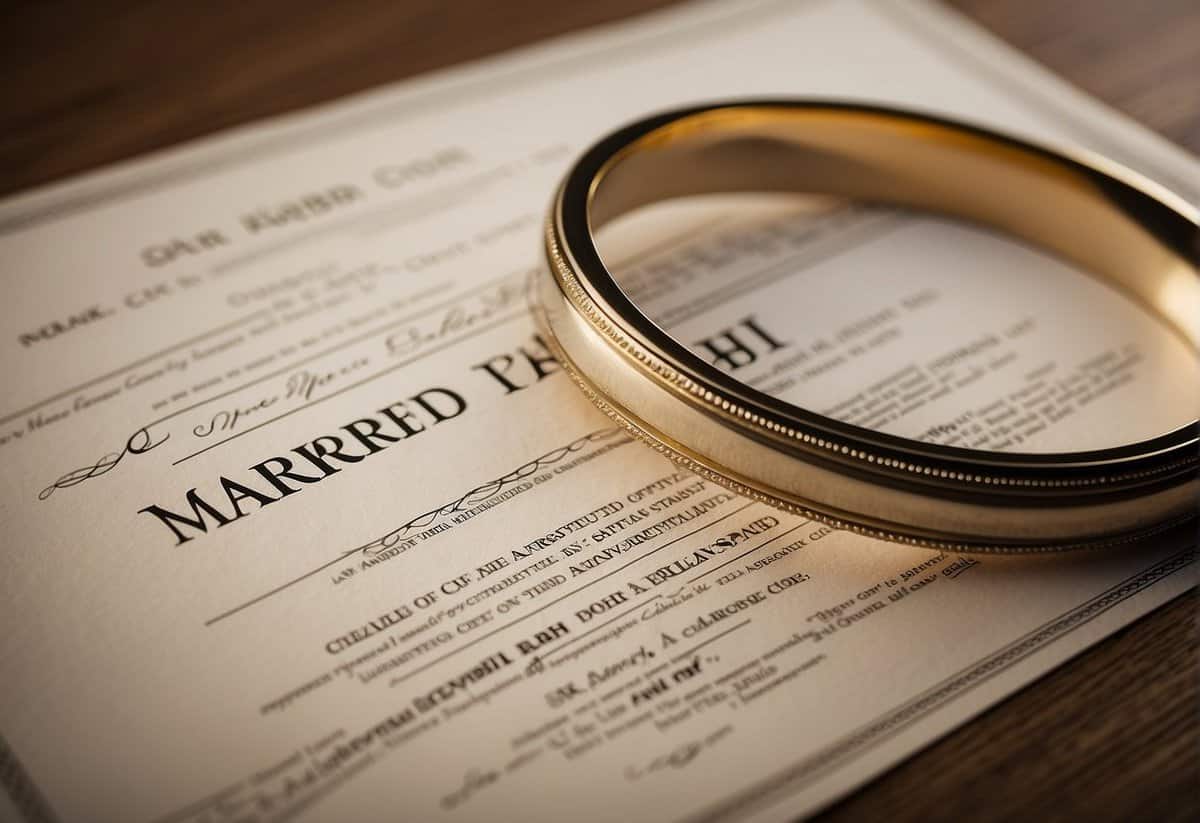Can I Marry Someone If I Am Already Married? Understanding Polygamy and the Law
Considering marriage while already married can raise fundamental legal and ethical questions. Legally, the concept is known as bigamy, which is the act of entering into a marriage with one person while still being lawfully married to another. It’s crucial to understand that bigamy is a criminal offense in virtually all jurisdictions, and undertaking such an action can have serious legal consequences.

If you discover your spouse was already married at the time of your wedding, the legality of your current marriage could be in question. Although the situation may seem complex, it’s typically resolved in a straightforward manner by the legal system: marriages entered into while one partner is already married are generally considered void from the start. Understanding the requirements and implications before altering your marital status is important. This helps to ensure that the path you choose is in accordance with the law and respects all parties involved.
Key Takeaways
- Bigamy is illegal and refers to marrying someone while already being married.
- Marriages where a spouse is already married are usually considered null and void.
- Understanding legal requirements and implications is vital prior to changing marital status.
Legal Implications of Marrying While Already Married

In navigating the complexities of marital laws, it’s important to understand that marrying when you’re already legally bound to another person can lead to significant legal repercussions.
Understanding Bigamy and Polygamy
Bigamy—the act of entering into a marriage with one person while still legally married to another—is illegal in all 50 U.S. states. While polygamy—having more than one spouse at the same time—is acknowledged in some cultures, it remains against state laws in the United States. If your new union occurs without the first being legally dissolved, it’s seen as an invalid marriage.
Consequences of Bigamy
Bigamy is not only a violation of moral standards but also a criminal offense, classified typically as a felony. Consequences vary by state but can include:
- Imprisonment: Jail time for bigamy can be significant, with sentences potentially ranging from months to several years.
- Fines: Monetary penalties are often imposed in addition to or in lieu of imprisonment.
- Criminal charges: Beyond bigamy itself, entering into a legal marriage while married can lead to additional criminal charges related to fraud or deception.
The U.S. Supreme Court has consistently upheld laws against bigamy, reinforcing their legality and the commitment to monogamous marriage.
Annulment and Invalid Marriages
If you find yourself in an invalid marriage because either you or your partner was still legally married to someone else, an annulment might be necessary. This is a legal procedure that declares your marriage null and void—as if it never occurred. The existence of a legal spouse at the time of a subsequent marriage automatically makes the latter void, and generally, there’s no need for a divorce proceeding; however, you may still need an annulment to resolve any potential legal entanglements.
The Divorce Process and Remarriage

Before you consider remarrying, it’s crucial to understand that you must be legally divorced through a proper divorce process. This ensures that you are eligible to apply for a new marriage license and remarry.
Steps to Obtain a Divorce
To begin the divorce process, you must file a petition or complaint with your local court. The specifics can vary by location, but generally, you’ll need to:
- File a Petition: Submit the necessary legal documents to request a divorce.
- Serve Your Spouse: Legally inform your spouse of the divorce proceedings.
- Wait for a Response: Your spouse has the opportunity to file a response to your petition.
- Negotiate Terms: Discuss division of assets, custody, and other important matters.
- Attend Court Hearings: Participate in any required court appearances.
- Obtain a Divorce Decree: The final step is receiving your divorce decree, which officially ends your marriage.
Remember, you cannot remarry until the divorce decree is final.
Eligibility for Remarriage after Divorce
Once you have your divorce decree, you’re legally divorced and can pursue a new marriage. However, some states have a waiting period before you can remarry. For instance, according to Hello Divorce, Alabama has a 60-day waiting period. On the other hand, some states like Kansas may waive this period under certain conditions.
When planning to remarry, always verify:
- Waiting periods in your state.
- All legal requirements are met.
- You have a valid marriage license for the new union.
It’s critical to ensure that your previous marriage is completely dissolved legally to prevent potential legal complications with your upcoming marriage.
Marriage Laws and Requirements

Understanding the legal prerequisites for marriage is important to ensure your union is recognized by law. This includes obtaining the necessary documentation, meeting age requirements, and adhering to state-specific rules.
Obtaining a Marriage License
To get married, you’ll need a marriage license from a local government office. In most cases, both parties must present proof of their identity and age, such as a driver’s license or birth certificate. Some states also require a blood test or premarital counseling. A marriage license is a crucial step in legally formalizing your relationship.
Waiting Periods and Age Requirements
The legal age to marry in the U.S. is typically 18; however, minors can marry with parental consent and, in some states, judicial approval. Additionally, once you obtain your marriage license, there is often a waiting period before it becomes effective. This can be as short as 24 hours or up to several days, depending on state laws.
State-Specific Marriage Certificates
After your ceremony, the officiant and sometimes a witness will sign your marriage certificate, which you must file with the local government. Each state has unique certificates and filing processes, so it’s crucial to follow your state’s procedures to ensure your marriage is legally recorded. Keep in mind that common law marriages are recognized in some states, and if you’re a U.S. citizen marrying a foreigner, your marriage certificate plays a critical role in the immigration process.
Personal Considerations and Support

When considering marrying someone while already in an existing marriage, it’s essential to reflect on the emotional complexities and seek proper support. Your values, beliefs, and personal circumstances all play pivotal roles in how you navigate this situation.
Emotional Aspects of Relationships
Love and affections are often at the heart of why you’re contemplating a new engagement, despite an existing marriage. It’s important to recognize that feelings can lead to complex affairs that affect all parties involved. Honest introspection about what you truly seek in a relationship is a crucial step in understanding your emotions.
Seeking Marriage Counseling
If there’s a conflict between your current marital situation and your feelings for someone else, marriage counseling might help. It’s a space where you can unpack emotions safely and gain clarity on the future of your union. Whether you aim to strengthen your existing marriage or navigate the path to separation, professional guidance can provide significant support.
Religious and Cultural Views on Marriage
Different faiths and cultures hold varied views on the sanctity and indissolubility of marriage. For instance, in Muslim and other religious communities, marriage is a covenant not just between two people, but often with the divine. It’s crucial to be aware of the implications an additional marriage could incur, including potential social and religious consequences within your community.
Frequently Asked Questions

This section aims to address common inquiries you might have about the implications and legalities if you are considering marriage while still being married to someone else.
What are the legal consequences of marrying someone while still legally married to another person?
Marrying someone while you are still legally married to another individual is considered bigamy, which is illegal in most jurisdictions. The second marriage would typically be void and may result in legal repercussions.
Is it possible to validate a second marriage without first dissolving the first one?
No, it’s not possible to legally validate a second marriage without dissolving the first one. The first marriage must be legally ended through divorce or annulment before another marriage can be legally recognized.
What steps should be taken if you discover your spouse has remarried without obtaining a divorce?
You should seek legal advice immediately. An attorney can help in identifying the appropriate legal actions, which might include filing for divorce or an annulment, and potentially pursuing charges for bigamy, if applicable.
How do marriage licenses work in terms of preventing unlawful polygamous marriages?
Marriage license applications typically require you to swear that you are not currently married, or if you have been previously married, that the marriage has been legally concluded. This is a precaution to prevent illegal marriages.
What legal penalties can be faced for entering into a marriage when already married?
The penalties for bigamy vary by jurisdiction, but can include fines, probation, or imprisonment. Bigamy is a criminal offense in many places, and those who engage in it can face serious legal consequences.
What is the term for having more than one spouse at the same time in a jurisdiction where it is illegal?
The term for having more than one spouse at the same time in a place where it is illegal is bigamy. It is distinct from polygamy, which refers to the practice of having multiple spouses and may not necessarily be tied to legal marriage.


